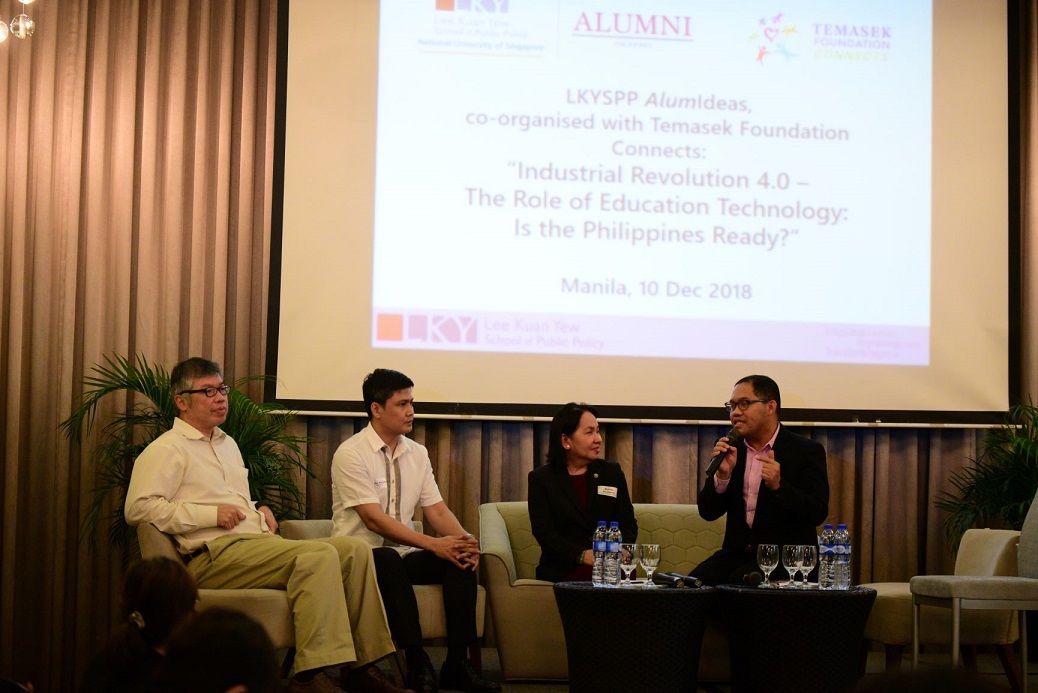The Lee Kuan Yew School of Public Policy Alumni Philippines Chapter co-organized with Temasek Foundation Connects a panel discussion titled, “Industrial Revolution 4.0: The Role of Education Technology, Is the Philippines Ready?” in Manila on 10 December 2018.
The event was well attended by LKYSPP alumni and friends of Singapore in Manila. The current Master in Public Administration (MPA) cohort also joined in the event as it coincided with their Governance Study Project trip to the Philippines.

The discussion was moderated by Mr. Mc Ronald Banderlipe (MPA 2013) and featured the following speakers:
- Prof. Melinda Bandalaria, Chancellor and Professor at University of the Philippines Open University, and President of the Asian Association of Open Universities
- Mr. Verbo Bonilla (MPM 2009), former Director of Public Service Business Development, SAP Philippines
- Mr. Bernard Ng (Thiam Hee Ng), Principal Economist, Southeast Asia Department, Asian Development Bank
Prof. Bandalaria started the discussion by defining the key characteristics of the Fourth Industrial Revolution (4IR) and the role of technology in the education sector. The 4IR highlights technology and connectivity at the center of things, the future of living. The 4IR is the internet of systems akin to the “Connected Car”, a device that talks with any number of other systems – a home network, manufacturers, and peers. It is not a stand-alone device and has little value being a stand-alone device. 4IR is not only changing the way we do business, but also the way we develop human capital. It is hinged on an accessible, affordable, high-quality internet connectivity, mobile technology and the internet of things (IoT). Technology moves fast and it is imperative that government, businesses and the education sector adapt to the changing times to stay relevant.

Is ASEAN ready for 4IR? Based on three drivers of 4IR, ASEAN is underprepared at the moment.
Is ASEAN ready for 4IR? Based on three drivers of 4IR, ASEAN is underprepared at the moment. Firstly, while measures to improve internet connectivity, the backbone of 4IR, has been taken in the last few years, progress remains unequal. Cambodia, Indonesia, and Viet Nam experienced negative growth rates in digital infrastructure. Lao PDR has a negative growth rate in terms of connectivity usage. Secondly, ASEAN still lacks a bloc-wide standard for e-commerce with member states imposing different customs duties on exports and imports. Finally, developing technology-driven human capital in ASEAN remains uneven among member states. Singapore, Malaysia, and the Philippines are the only ASEAN members with comprehensive strategies to help develop a pool of tech-savvy human capital. Most member states still rely on old traditional curriculums, and many schools lack proper equipment.
Similarly, many universities in ASEAN are also not ready for 4IR. Only less than a quarter of the education sector is ready to equip their students with the new skillsets for their future job roles. The priority is given to enroll the students, and the quality improvement of the learning experiences is not necessarily considered as a top priority. Overall, universities in ASEAN need to converge their respective University Social Responsibility towards 4IR and the Sustainable Development Goals (SDGs).

4IR offers both opportunities and challenges to the Philippines. While mobile phone ownership and penetration for smartphones is at 32%, internet users account for 63% of the population of 143 million Filipinos.
Cognizant of these sweet spots, the Philippine government has adopted a digital strategy, “a digitally empowered, innovative, globally competitive and prosperous society where everyone has reliable, affordable, and secure information access in the Philippines. A government that practices accountability and excellence to provide responsive online citizen-centered services. A thriving knowledge economy through public-private partnership.” With government support through pieces of legislation passed in Philippine Congress, there is an increasing practice of Open Education and Distance Learning.
The crucial challenge for the Philippines is still to narrow the digital divide (the cost and speed of internet). The Philippines ranked at 100th globally, way below its ASEAN 4 (Singapore at 7th rank, Malaysia at 62nd rank, Indonesia at 77th rank, Thailand at 21st rank) neighbors in terms of average connection speed. Among the ASEAN 4, the Philippines recorded a dismal average speed of 5.5 Mbps in the First Quarter of 2017.

Nonetheless, Philippine universities are responding, albeit slowly, to the challenges of 4IR. The University of the Philippines (UP) through the UP Open University (UPOU) was established in 1995 and mandated to democratize access to quality higher education through distance learning. UPOU is a public service university and started doing distance eLearning in 2001, and eventually becoming fully online in 2007, with students in more than 70 countries.
4IR requires the labour force to possess specific skillsets that universities may not be teaching yet. This underscores the importance for universities and schools to work together with the private sector and the government to design curriculums and trainings as well as a supportive ecosystem that promotes the use of technology in schools. In equal importance, data privacy and security needs to be strengthened for sustainability of this new ecosystem.
While the 4IR is expected to bring net benefits to society, there are winners and losers as society adjusts to the new way of doing things. It is important to address this and at the same time adopt creative strategies that will develop a pool of human capital ready for the jobs of the future. All stakeholders from the public sector, private sector and education sector need to work closely together in order to harness the highest benefits of 4IR.